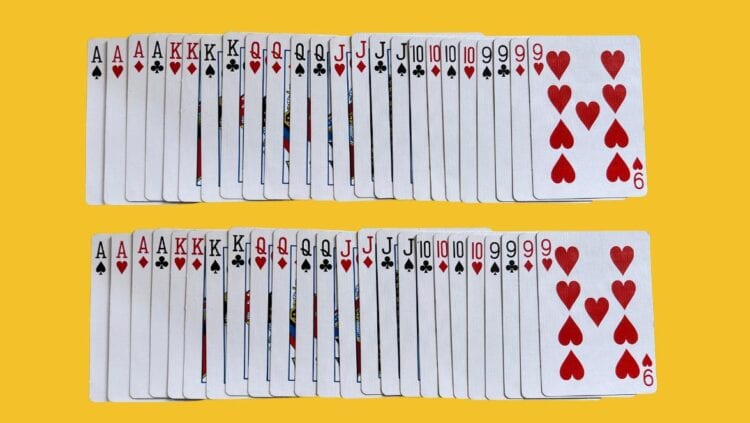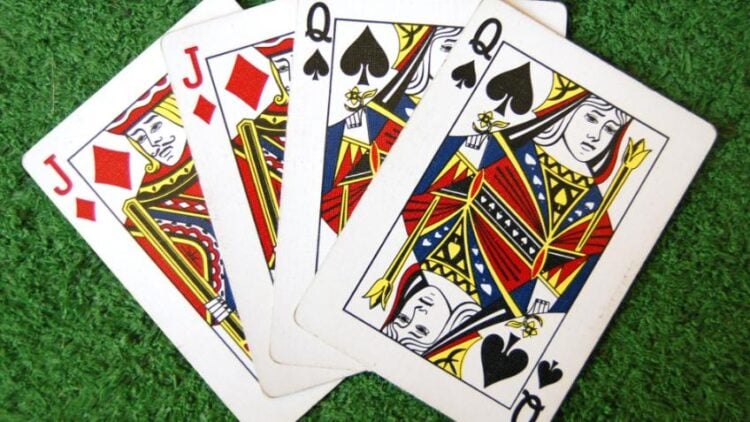
OBJECTIVE OF PINOCHLE: Win tricks and collect the most points.
NUMBER OF PLAYERS: 2 to 4 players (4 players play with partners)
MATERIALS OF PINOCHLE: 48-card deck made up of two of the following in each of the four suits: A, K, Q, J, 10, and 9
TYPE OF GAME: Card game
AUDIENCE: Kids, Teens, and Adults
OVERVIEW OF PINOCHLE
Pinochle is a trick-taking and melding card game with components similar to Bridge, Euchre, Spades, and Hearts. But on top of that, it also has similarities to the popular kid’s game War. Sounds like fun, right? This super entertaining game is one of the best card games out there for a reason. If you want to join in on the fun, that’s where we come in! Here are the game rules for the card game Pinochle.
SETUP OF PINOCHLE

The Pinochle deck has 48 cards. In each of the four suits, the deck has two of each: A, K, Q, J, 10, and 9. These cards, however, do not follow the traditional ranking.
Ace is high, followed by 10, then K, and are often referred to as counters. This means these cards are always worth points.
Q, J, and 9 are not worth any points. When these cards are valued at 0 points, they are referred to as noncounters.
Since there are different scoring methods, make sure all players agree on the method before dealing the cards.
HOW TO DEAL IN PINOCHLE
Choose a random dealer, using any method of your choosing. The dealer then will shuffle the cards thoroughly and distribute 12 cards to each player, 3 or 4 cards at a time. The deal starts to the left of the dealer and moves clockwise, ending with their own set of cards. If you have any cards left over, leave them in the middle of the table.
You should also pay attention to the following rules according to how many people are playing:
- 2-player rules: Deal 12 cards to each player and flip over the top card of the deck, which is the trump suit.
- 3-player rules: Deal 18 cards to each player and put the remaining 3 cards in the middle. A player may win these 3 cards.
- 4-player rules: Deal 12 cards to each player with partners sitting across from one another.
Once each player has their hand, they examine their cards and prepare for the auction or bidding phase.
*If playing without bidding, after the deal, the dealer flips over the top card of the deck and places it face-up on the table. The suit of this card is the trump suit and all cards of that suit beat cards of all other suits. High ranking trump cards beat other trump cards. The remainder of the deck is placed face-down on the table and is the stockpile.
HOW TO PLAY PINOCHLE

Now that we’ve got everything set up, let’s officially learn the Pinochle rules!
THE AUCTION/THE BID
Pinochle starts with the bid.
A bid is a prediction of the number of points your hand might earn. The player who bids the highest, or the winner of the bid, has the following perks:
- declare trump suit
- receive cards from their partner
- lead the first trick
The minimum bid players must make is 250 points. Bids increase by factors of 10 and consist only of a number. The bid goes around the table until each player passes, and a winner is declared. Starting to the left of the dealer, and moving clockwise, players have the following options during bidding:
- bid normally, by bidding 10 points higher than the previous bid
- give a jump bid, and bid 20 points higher than the previous bid
- pass and leave the bidding
- OR pass with help, which means you pass, but you are giving extra information to your partner.
After the winner emerges, they announce the trump suit.
2- AND 3-PLAYER PINOCHLE RULES
2-player rules: Skip the bidding section of the game.
3-player rules: The winner of the bid takes the 3 cards in the middle and adds it to their hand. Then, they’ll take 3 cards from their hand and put them in a trick pile to score at the end.
PASSING CARDS
If playing the 4-player game, the winner of the bid and their partner have the right to exchange cards. The winner’s partner selects exactly 3 cards to pass to their partner. The declarer (winner of the bid) adds those 3 cards to hand and examines them. After, they send back 3 cards to their partner, which can include sending back some cards they just received.
MELDING

Pinochle is an iconic game that can get competitive quickly! After the passing of cards, all players can place their melds on the table. Melds are made of particular card combinations, each combination having its own point value. Players can create various types of melds, including arounds, flushes, marriages, and pinochle.
AROUNDS
- Aces around (100 Aces) – four Aces, different suits – 100 points
- Kings around (80 Kings) – four Kings, different suits – 80 points
- Queens around (60 Queens) – four Queens, different suits – 60 points
- Jacks around (40 Jacks) – four Jacks, different suits – 40 points
- Aces abound (1000 Aces) – eight Aces – 1,000 points
- Kings abound (800 Kings) – eight Kings – 800 points
- Queens abound (600 Queens) – eight Queens – 600 points
- Jacks abound (400 Jacks) – eight Jacks – 400 points
MARRIAGES & FLUSHES
Marriages and flushes are the sequence combinations.
- Trump Marriage – K and Q of Trump suit – 40 points, 80 points if double
- Marriage – K and Q of any suit – 20 points, 40 points if double
- Marriages around – K and Q in each suit – 240 points
- Flush (run) – A, 10, K, Q, J in trump suit – 150 points, 1,500 if double
PINOCHLE
- Pinochle – J of diamonds and Q of spades – 40 points
- Double Pinochle – both J of diamonds and Q of spades – 300 points
- Dix – 9 in trump suit – 10 points
Once each player sets their melds out, they are scored and recorded on the scoring pad.
Since there are a maximum of 250 points available in the trick-taking phase (the following phase) of the game, if the declarer is 250+ points under their bid after melding, they may throw in their cards and not participate in the trick-taking whatsoever.
If their bid is within 250 points after melding, they may play their hand in the trick-taking.
2-PLAYER PINOCHLE RULES
If playing Pinochle as a 2 player card game, do not lay out your melds yet.
TRICK-TAKING
After scoring the melds, players pick up their hands and prepare for the trick-taking portion of the game.
The declarer leads the initial trick by playing any card they wish. You win a trick by playing either the highest-ranking trump card or, if there are no trumps, the highest-ranking card that follows the leading suit. During a trick, each player plays exactly one card.
This continues until players play their entire hand. Each trick after the first trick is led by the winner of the previous trick. Trick-taking follows the rules below:
- When you can follow suit, you must. If you have a card in hand that matches the leading suit, you must play it. Play a higher ranking card than the lead if possible.
- If you are unable to follow suit but have a card in hand from the trump suit, you must play that card. This is called trumping the trick. If the suit led with was a trump, play a higher ranking trump card if possible.
- In the event you can neither follow suit nor play a trump, you may slough. This means playing any card at all.
Each team should designate a puller. This player will collect the cards from tricks won in a face-down pile in front of them for scoring later in the game.
2-PLAYER PINOCHLE RULES
After playing a trick, the players draw a card from the deck in the middle of the table. Then, the winner of the trick may lay out a meld and get points for it.
Once there are no more cards in the deck, pick up any of your melds on the table. Then, continue playing tricks until you run out of cards.
SCORING
After playing all 12 tricks, players score the cards collected. There is a total of 250 points players can collect during the trick-taking phase of this game.
- Aces, 10s, and Kings are worth 10 points each (a total of 240 points), plus
- Winning the final trick is also worth 10 points.
If the declarer matches or exceeds their bid, their total score (melds + tricks) is added to their running total. If they are unable to match their bid, the amount of the bid is subtracted from their running total.
When declarers “throw in,” their opponents score their melds. Tricks are not scored as no tricks are played. The declarer loses the amount they bid.
END OF GAME
The game continues until a team scores 1,500+ points or another predetermined amount. If both teams hit 1,500 points in the same round, the declarer’s team automatically wins.
STRATEGIES FOR PINOCHLE
There are many strategies you can employ to win Pinochle, whether you play with a partner or not. Here are some of our top strategies for Pinochle:
- If your partner passes, you must bid!
- If your partner wins the bid, pass along the 3 of the strongest cards in your hand, keeping in mind the trump suit.
- When playing with a partner, if you can avoid it, don’t send back any trump cards. If you must, send a 9.
- Identify losing cards in your hand; these are cards that have little chance of winning a trick. Generally, these will be any non-Ace cards in a non-trump suit.
- You can bid against your own partner, but be careful not to overdo it! You are working together, after all!
- Try your best to continue to lead the trick.
- If the other team wins the bid, pay attention to their melds in order to identify any losing cards beforehand.
VARIATIONS OF PINOCHLE
Before playing Pinochle, always make sure everyone is in agreement with the rules, as there are many variations of Pinochle. House rules can wildly differ, so having this conversation before bidding begins can help you avoid headaches and arguments down the line.
Here are some of the more common variations of Pinochle:
- Take one 0 off of each point. So, for example, each counter card is worth 1 point and an Ace around is worth 10 points.
- Only the 9 is not worth any points. Qs and Js are worth fewer points but can still help you collect more points. In this variation, Ace is worth 11, 10 is worth 10, K is worth 4, Q is worth 3, and J is worth 2 points.
- You don’t have to win the trick. In some variations, you can let your partner win, but in others, you must win if you can.
- 25 Top Birthday Party Games for Kids - July 23, 2024
- 40 SUPER FUN GIRLS NIGHT GAMES - July 16, 2024
- 40 Exciting Games to Play When You Are Bored - July 9, 2024